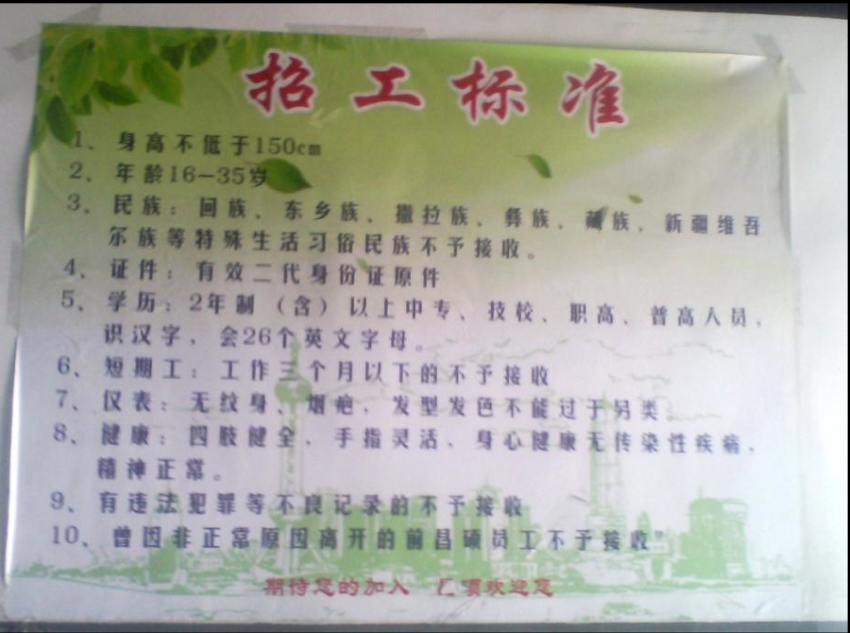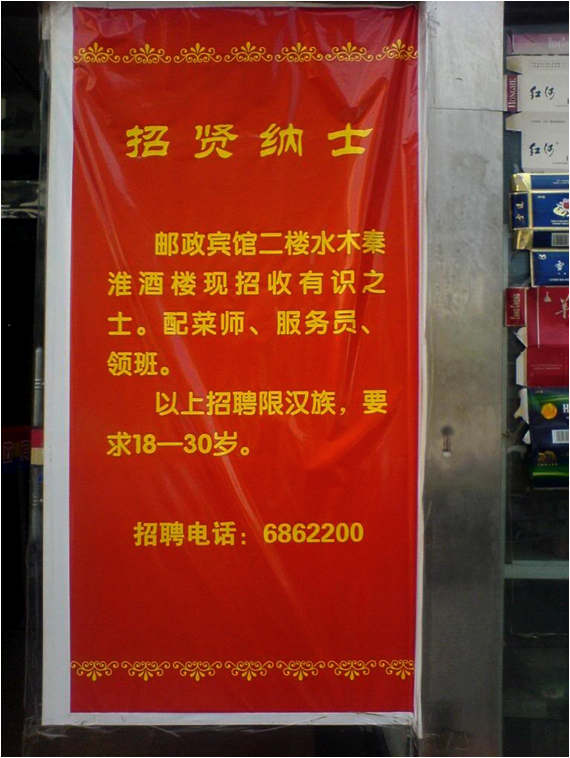Uyghurs, Other Ethnic Groups Need Not Apply

August 7, 2013
Greg Fay, Manager, Uyghur Human Rights Project
“Ethnic groups including the Hui, Dongxiang, Salar, Yi, Tibetan and Xinjiang Uyghur, with special lifestyles are refused admission.” So reads the sign at an Apple supplier factory in China, photographed by a China Labor Watch (CLW) investigator for a new report released by the New York-based watchdog group last week. The report analyzes three Apple suppliers and runs through a wide range of labor abuses, including ethnic discrimination in the hiring process of the Shanghai-based Pegatron factory.
The sign, entitled “Recruitment Standards,” greets jobseekers applying to the factory, which produces the iPhone, according to CLW’s report. In addition to Uyghurs, the Hui, Dongxiang, and Salar are also Muslim groups. (As for the religions of the other two groups listed: Tibetans practice Tibetan Buddhism, and the Yi, an ethnic group native to China’s southern border with Myanmar, is animist.) Other rules specify that no applicants be shorter than 150cm and only between ages 16-35.
The discrimination may serve to unite the targeted groups. Swiftly mobilizing, numerous Tibetan organizations have spoken out against the blatant and explicit discrimination: the Tibetan Women’s Association, Tibetan Center for Human Rights and Democracy, Free Tibet. The Tibetan Youth Congress (TYC) wrote a letter to Apple CEO Tim Cook to be delivered today by the San Francisco Regional TYC, which has also organized a protest for this morning at Apple’s nearby Berkeley, CA store, according to their Facebook page. Apple and Pegatron quickly responded that they would investigate, the Associated Press reports.
Hiring discrimination is common in China, especially targeting minorities. In a 2011 survey of 10,796 job advertisements, Hong Kong-based China Labour Bulletin found “significant discrimination against job applicants with ethnically distinct names”, and “only about half of the companies contacted had treated applicants equally regardless of ethnicity.” In East Turkestan, UHRP has documented widespread, systemic employment discrimination. In a report last year on the “Xinjiang Work Forum,” UHRP documented discrimination in government jobs, the education sector and the Xinjiang Production and Construction Corps. The report features discriminatory signage similar to Pegatron’s at the Postal Hotel in Kashgar.

Recruitment sign for Postal Hotel in Kashgar, photo taken July 2009. The last line reads, “This offer is for Han Chinese only, ages 18-30.” Courtesy of The Atlantic
The history of Uyghurs in China’s chaotic eastern factory regions is also troubled. In a 2008 report, UHRP analyzed a policy, then in its second year, to recruit young Uyghur women for work in factories in eastern China. Interviews with Uyghurs found that the jobs failed to provide the promised wages and basic working and living conditions. China’s policy of massive recruitment of Uyghurs exploded in 2009, after two Uyghurs were murdered and hundreds injured in a factory in southeastern Guangdong Province. Massive unrest followed the government’s brutal suppression of peaceful protests in Urumchi calling for justice in the factory murders.
Many Uyghurs have come to view these migrant factory jobs with suspicion, as depicted in the fictional novel The Vine Basket earlier this year. China Labor Watch’s report highlights another dimension to this nightmare: the myriad labor abuses perpetrated against all workers at the factories, and hiring discrimination targeting Uyghurs and other minority groups specifically. Thus, in addition to language and cultural adjustments facing migrant Uyghur workers, they must also consider that if the job mistreats them, a new one won’t be easy to come by. Even if a better job is hiring, it is likely, and possibly even publicly posted, that Uyghurs need not apply.
